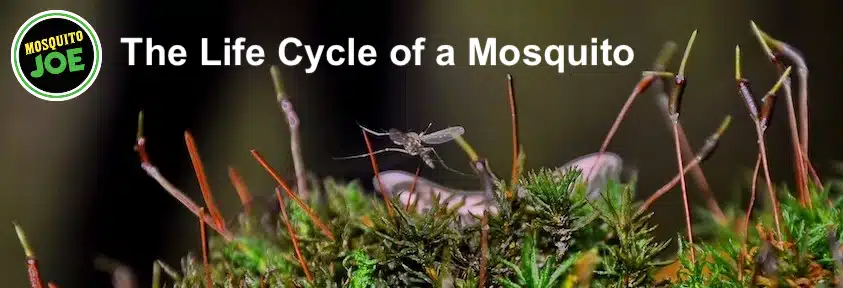Customers and potential customers ask us every day “How long do mosquitoes live?”. We also often find ourselves answering other questions like “How do you keep mosquitoes away?” and “What’s the best way to stop mosquitoes in my backyard?”. Knowledge is power, and once you understand the life-cycle of a mosquito you can gain valuable insight into how to manage them, keep them away and alter your expectations for your own backyard.
There are more than 3,500 different species of mosquitoes, with about 85 of those found in Texas. While they have varying preferences for a breeding habitat, they all undergo the same four stages of life. The mosquito’s life cycle is composed of the egg, larvae, pupa and adult stages.
First Stage: Egg
Female mosquitoes lay eggs in a variety of ways: some lay single eggs in water, some lay in rafts on water, where they float in numbers of up to 200. Other species opt to lay eggs on damp soil, where evidence of water remains. A mosquito egg can live up to 10 years in dry conditions, only to hatch when a drop of water hits it. They can be frozen and still hatch the following spring (not that we experience this in Texas), eggs can be churned over in soil and lie in wait until they are brought back to the surface when gardening. That new sod you had brought in? The new mulch in your yard? Full of mosquito eggs, just waiting for some water to allow them to hatch. Most eggs hatch within 48 hours of being laid, but all require water to do so. Keep in mind, it only takes about a teaspoon of stagnant water for 300 eggs to begin the process of transformation.
Second Stage: Larva
Mosquito larvae live in water and come up to the surface to breathe. Known as “wrigglers” these guys kick around in the water, going through 4 molting cycles where they shed their skin and grow into a larger one. Many species have a siphon tube which they use to breath, laying parallel to the surface of the water. These guys feed on organic matter in the water, so stagnant water is their home. They won’t be found in chlorinated water (like a swimming pool). Our technicians are well versed in spotting these guys and have found them just about anywhere you can imagine. Outdoor cushions, frisbee’s, cap-less fence posts and holes in trees. We use a larvicide in this water that prevents the larvae from moving into the next stage of life.
Third Stage: Pupa
Otherwise known as “tumblers”, this stage of life is a resting state. These guys do not feed and respond to light by flipping their tail and tumbling to the bottom of the container they are in. During this time, the mosquito is in its cocoon stage, preparing to hatch as an adult mosquito. Depending on the species, this can take around 2 days. At the end of this state, the pupal skin splits open and the adult emerges.
Final Stage: Adult
Once the mosquito emerges it rests on the water, allowing its body to harden and its wings to dry. Males typically emerge earlier than females and then lay in wait for the females to emerge. Once they are bred, the female mosquito of most species requires a blood meal to lay her eggs. This is where you, your pet or any number of animals in your yard get bitten. Once she has taken her blood meal, and has the protein she requires for the job, the female lays her eggs. She then seeks out a place to rest and feeds off of plant nectar (typically the underside of leaves away from the sun). The females will lay eggs every two to three days, repeating the process each time. The remainder of their short life is typically spent at rest, in dark moist areas of your yard. Males typically live about 10 days, while females live on average about 42-56 days. During that time, one female can lay up to 5,600 eggs. Depending on the location and the temperatures, this entire life-cycle can take about 2 weeks, with the right conditions and species, as short as 4 days.
Now that you know more about the life-cycle, you can answer the questions “How do you keep mosquitoes away?” and “What’s the best way to stop mosquitoes in my backyard?”. The main solution is in the water in your yard. The less water, the less locations for mosquitoes to lay eggs. Our certified pest control technicians will dump all the water in your yard that they can, treat the water they cannot to prevent larvae from hatching, and provide a barrier treatment to all that foliage in your yard where the adults spend time feeding and resting. They will also provide valuable insight for you into what you can do to help – cleaning gutters, storing kids toys out of the rain, even correcting drainage areas causing standing water. Be sure to give us a call and let us help you take your backyard back from pesky mosquitoes!
Searching through dozens of home and commercial service providers is a thing of the past. Rely on Neighborly’s national network of trusted, local service professionals for all your home and commercial service needs.





 App Store
App Store
 Google Play Store
Google Play Store